Examining the Book of Isaiah 5
Mike Ervin
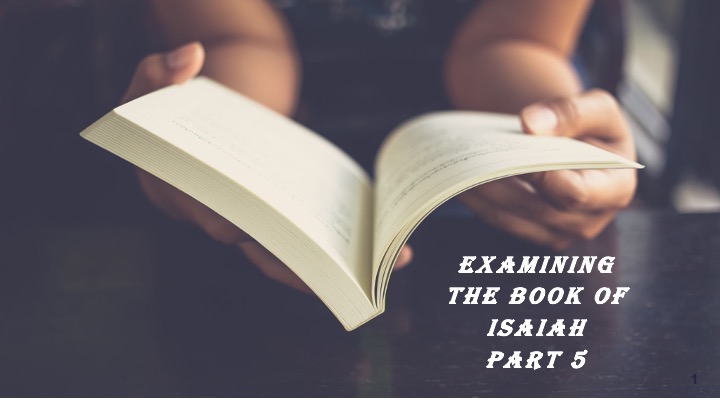
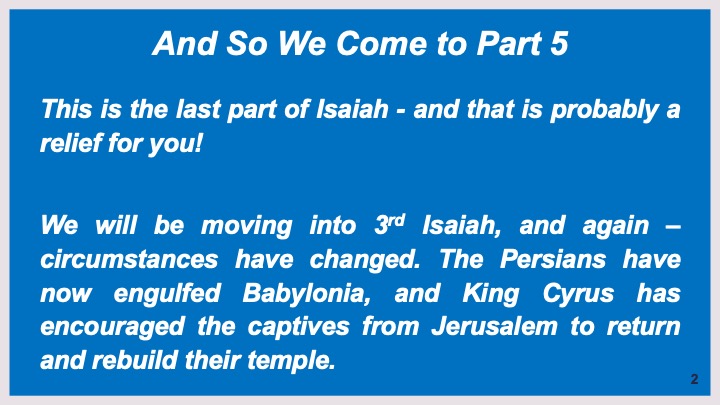
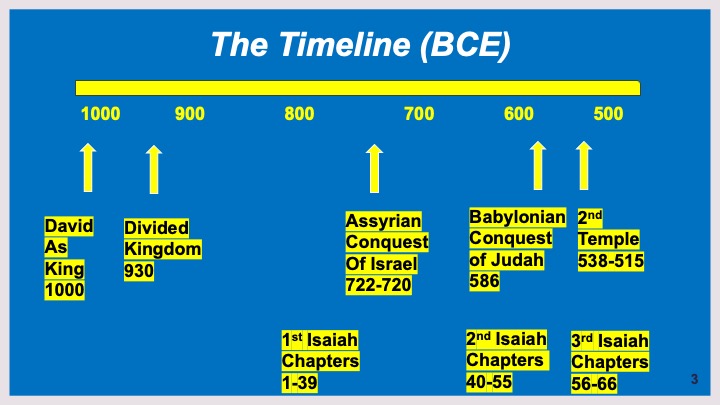
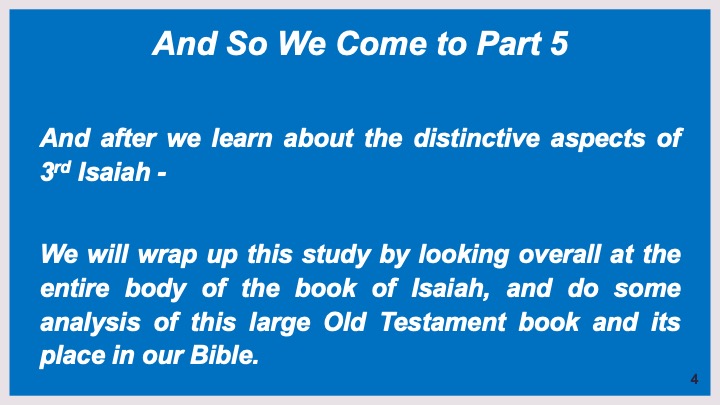
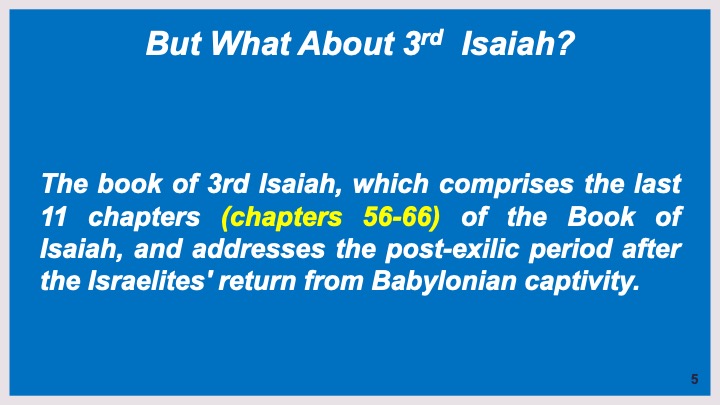
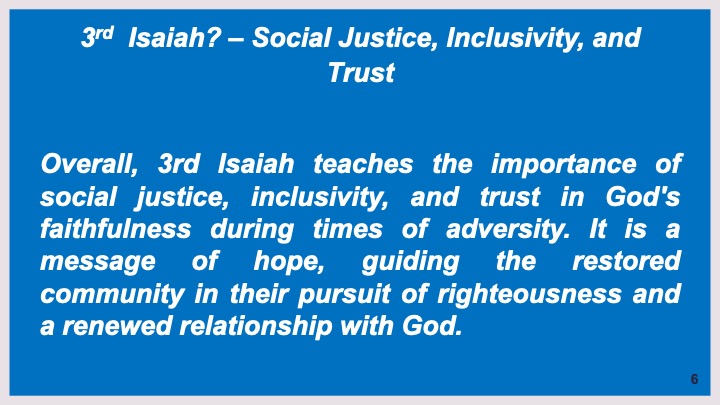
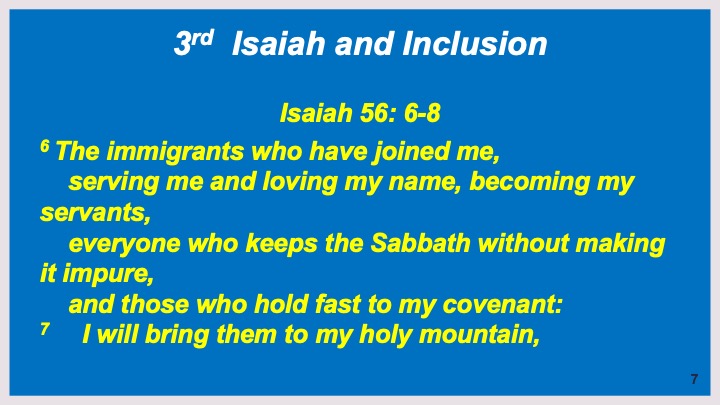
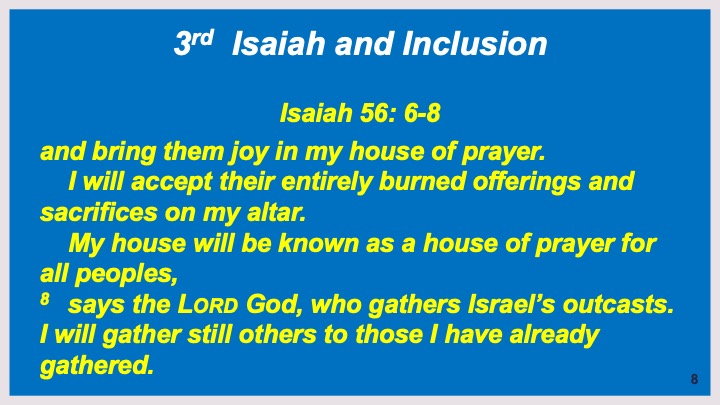
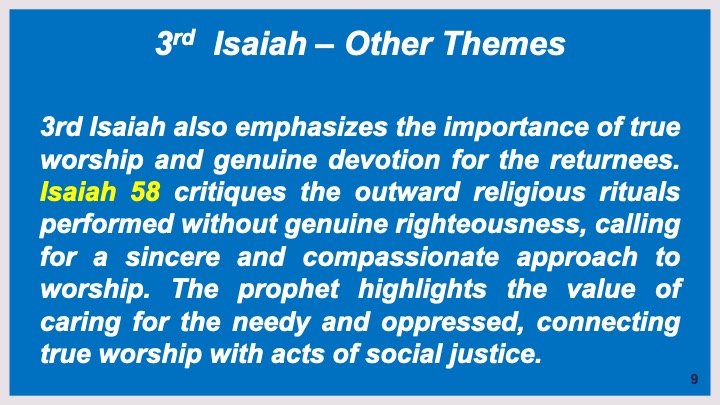
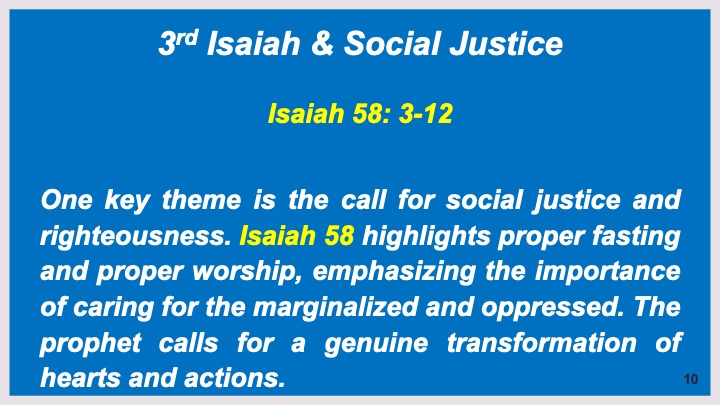
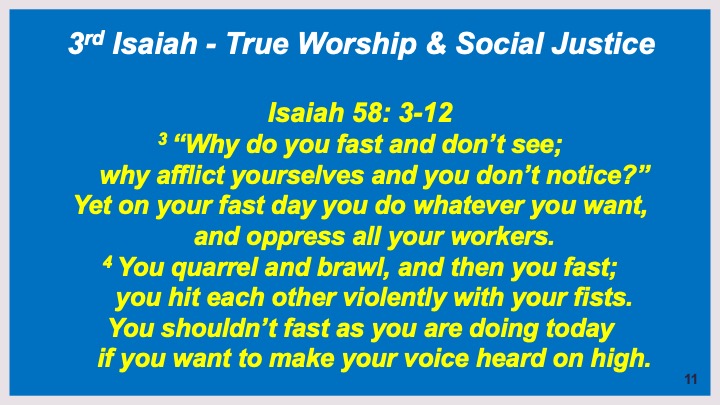
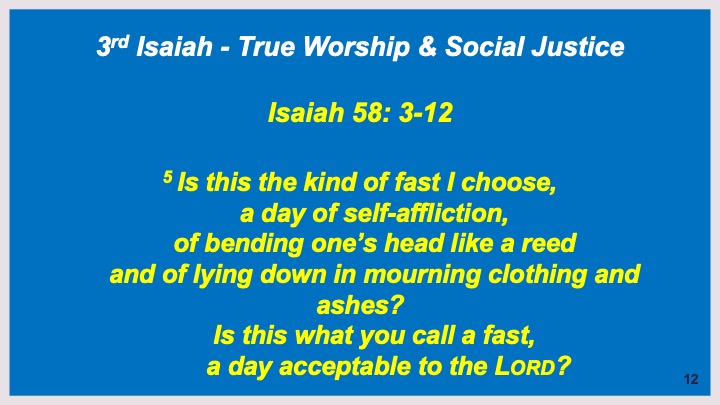
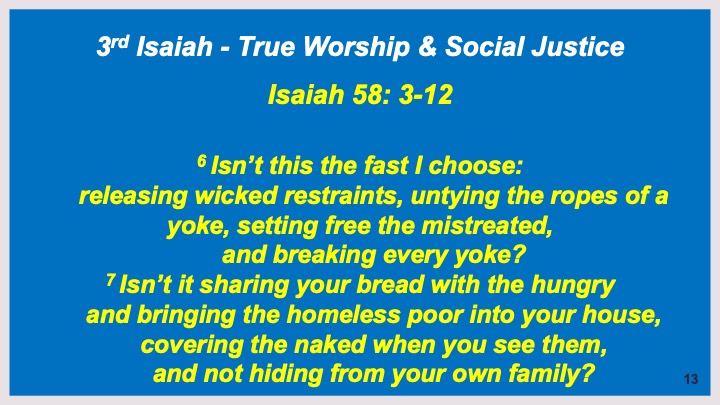
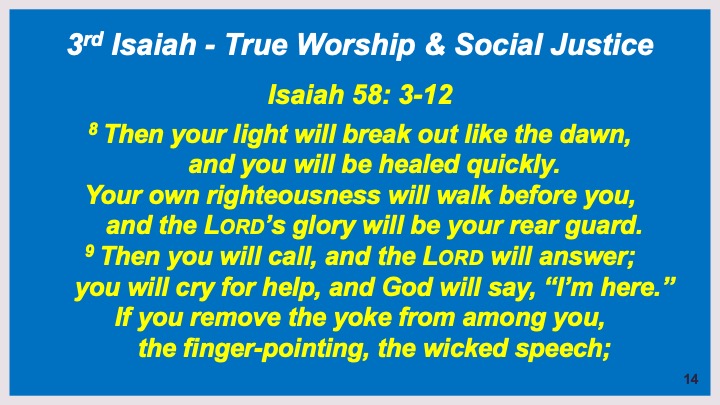
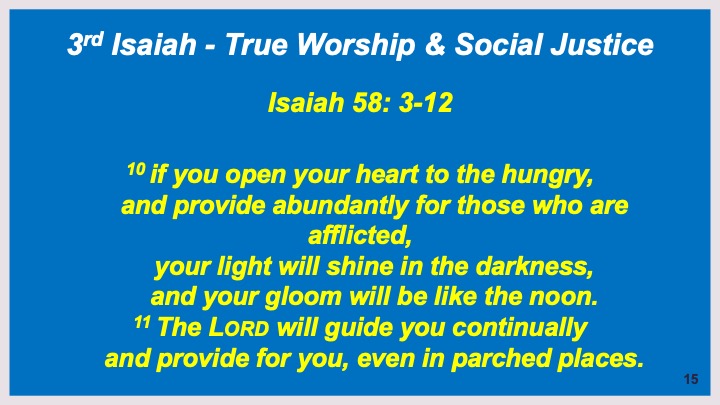
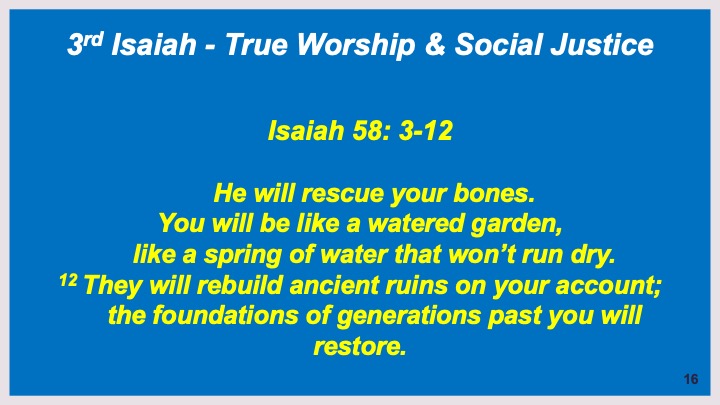
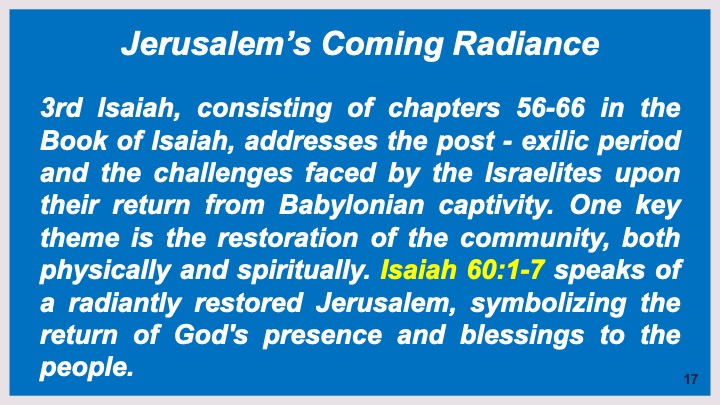
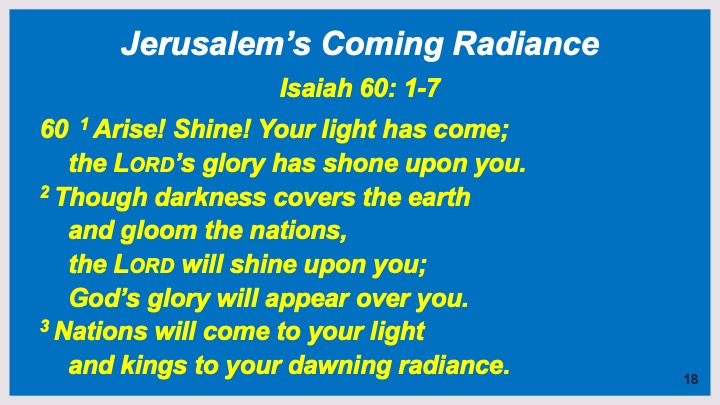
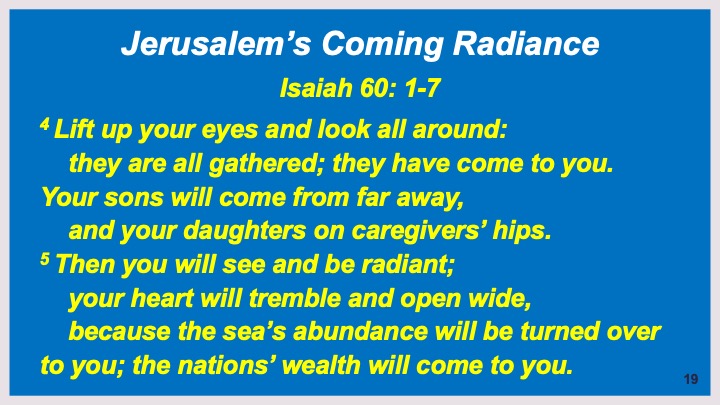
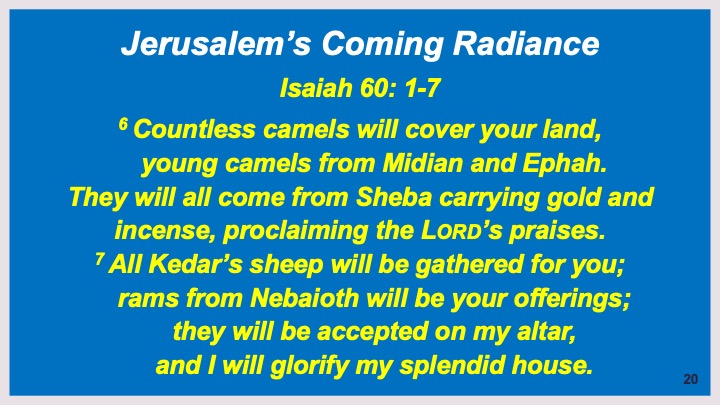
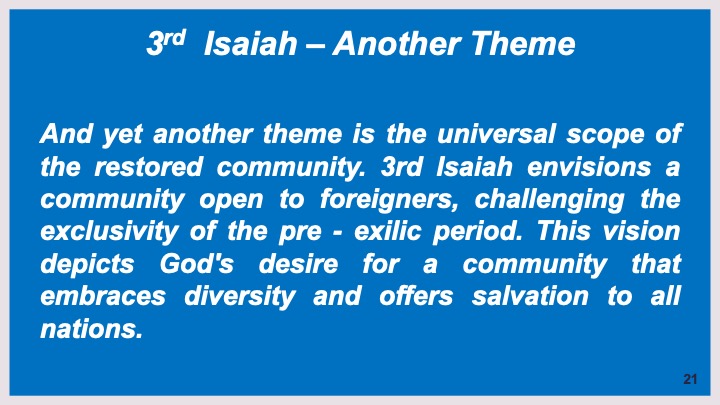
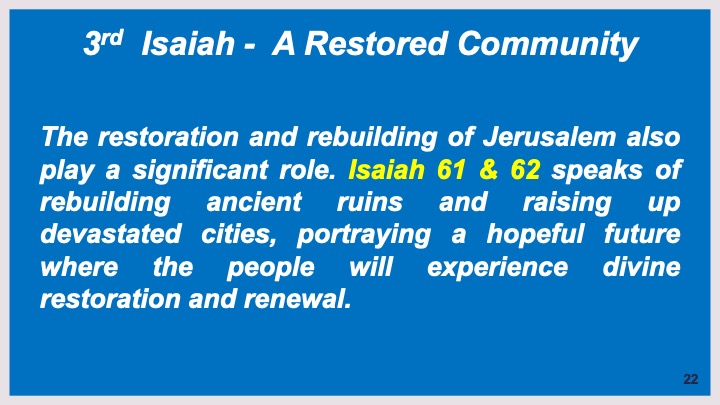
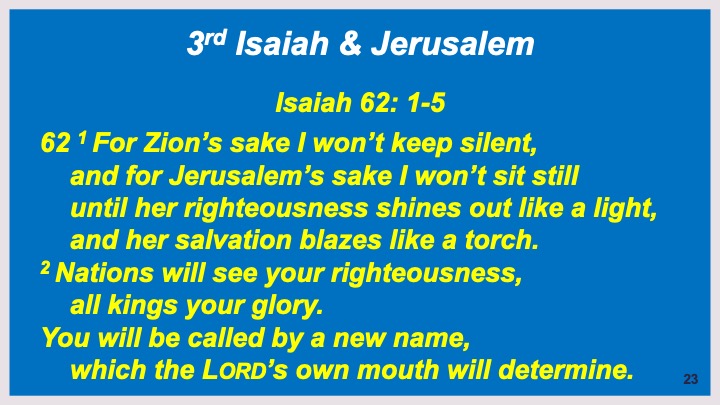
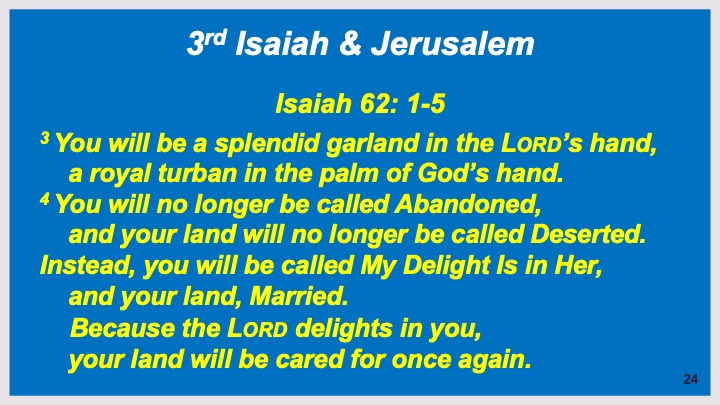
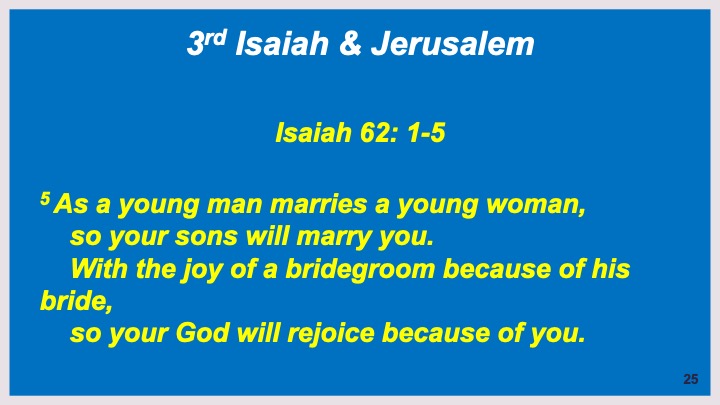
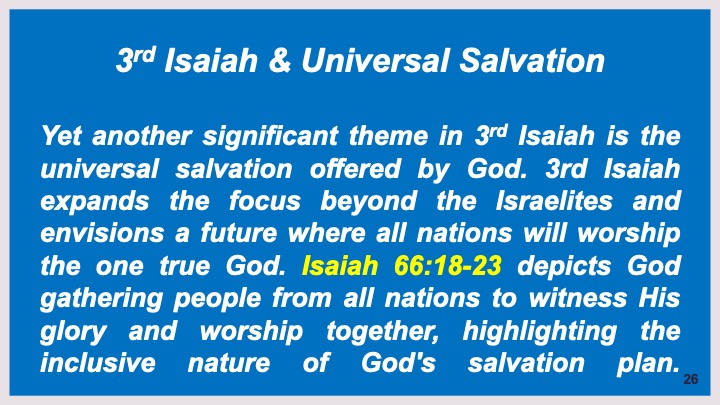
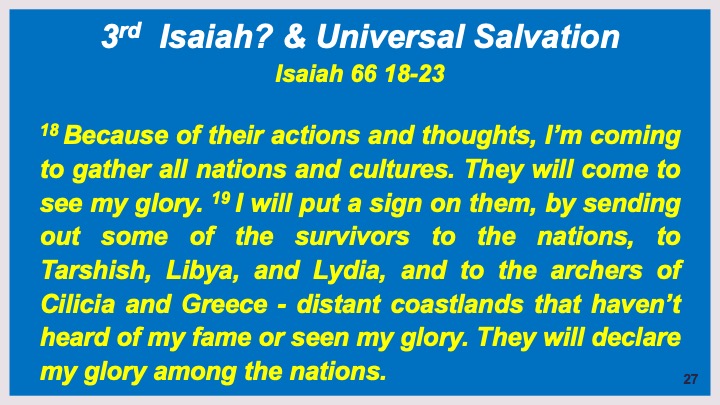
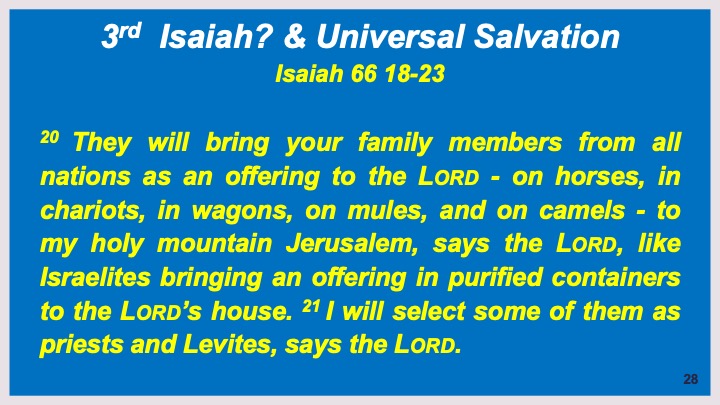
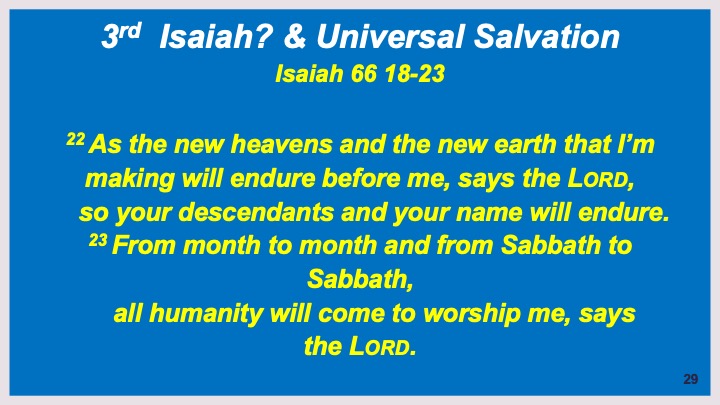
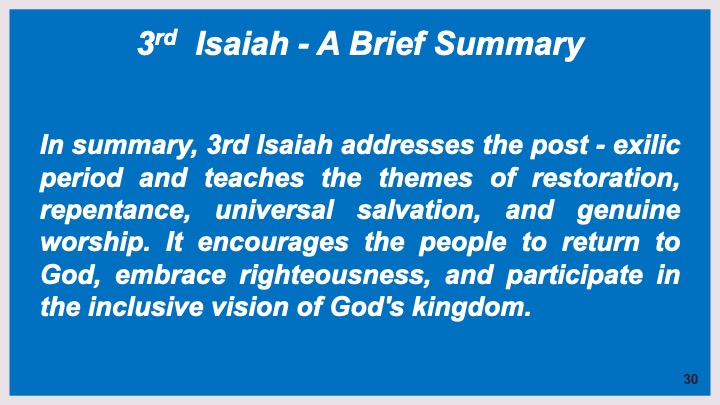
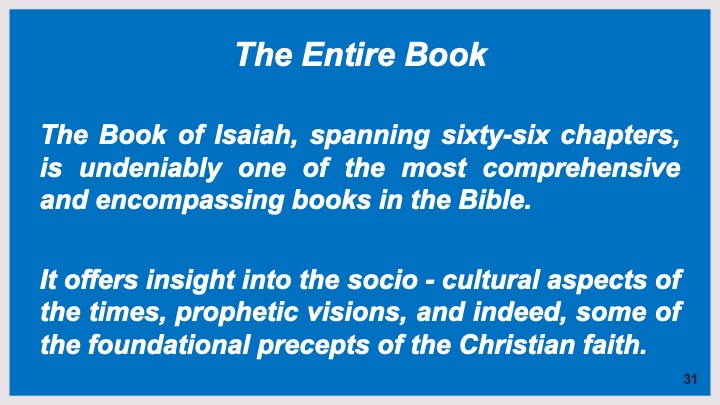
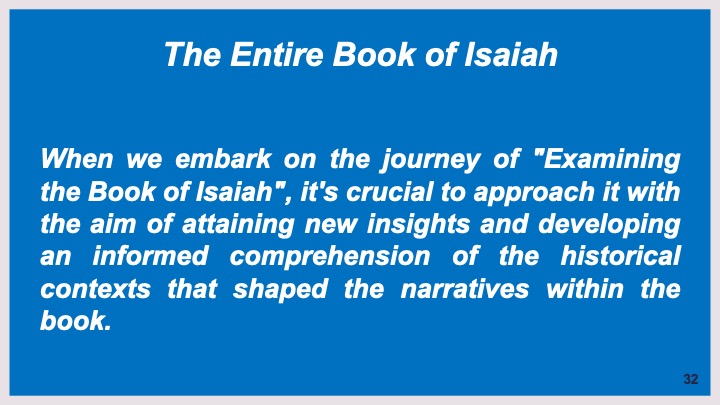
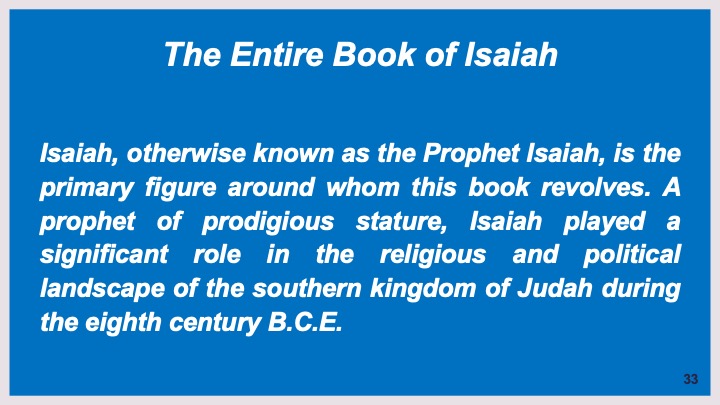
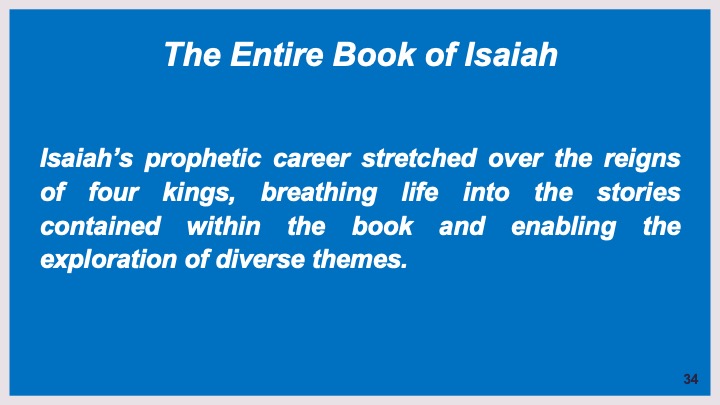
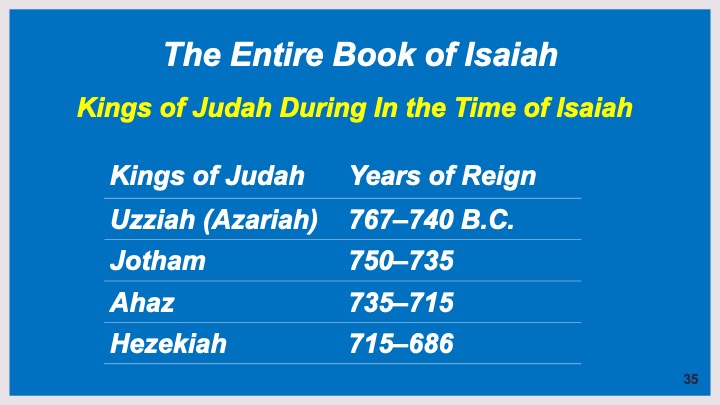
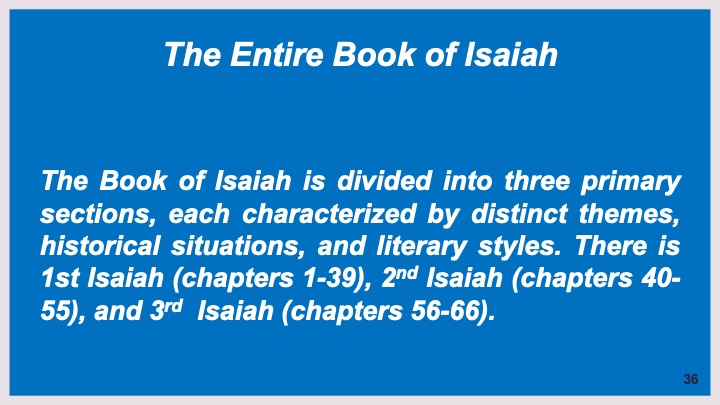
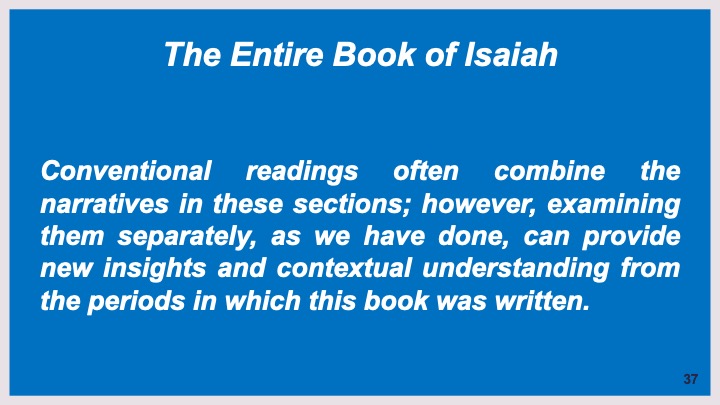
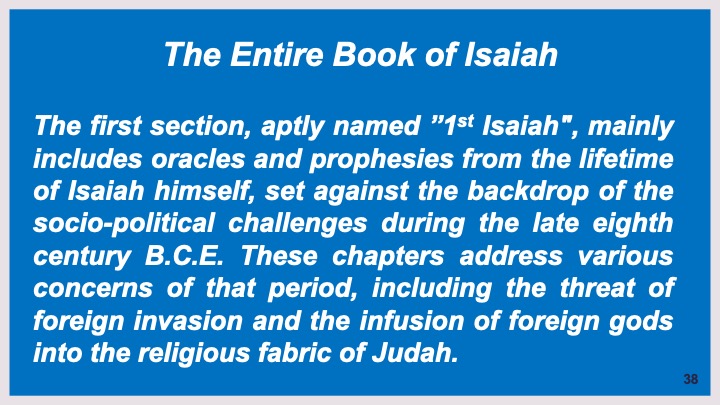
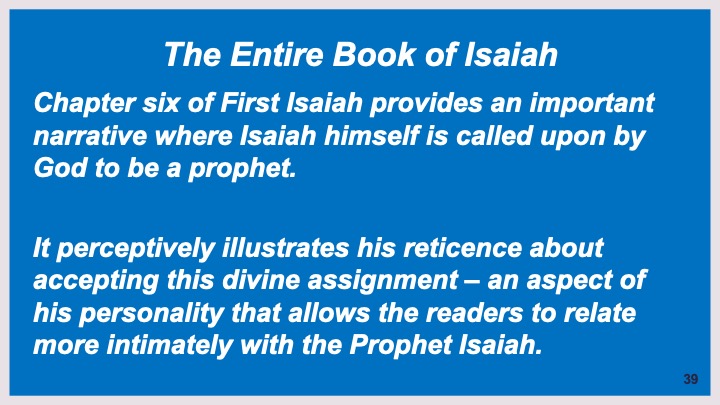
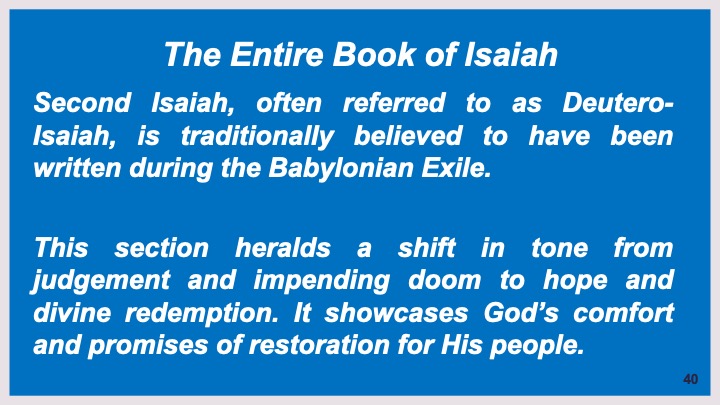
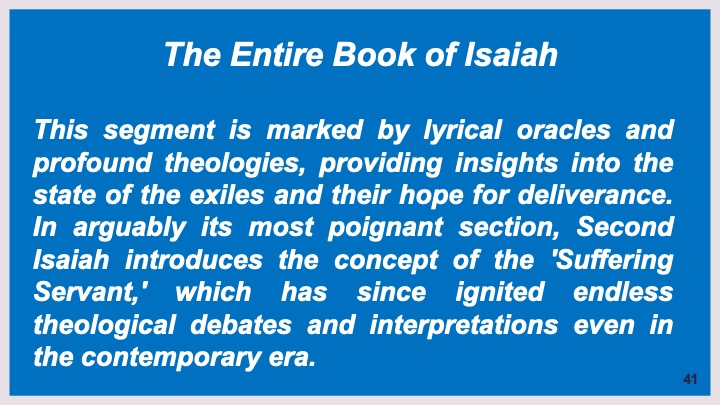
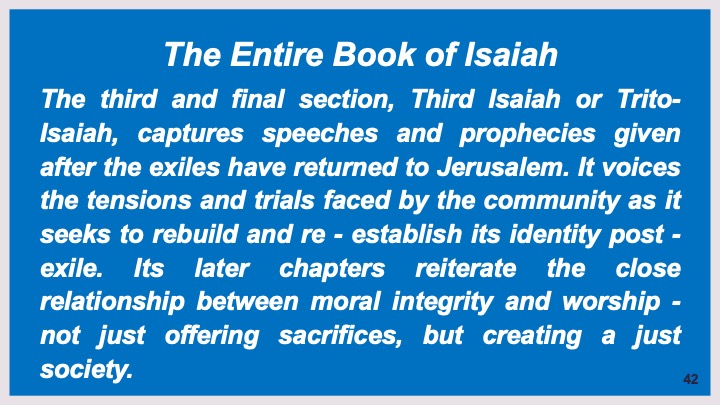
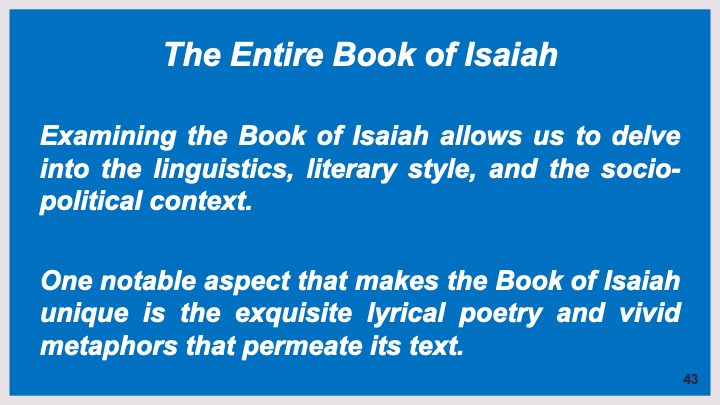
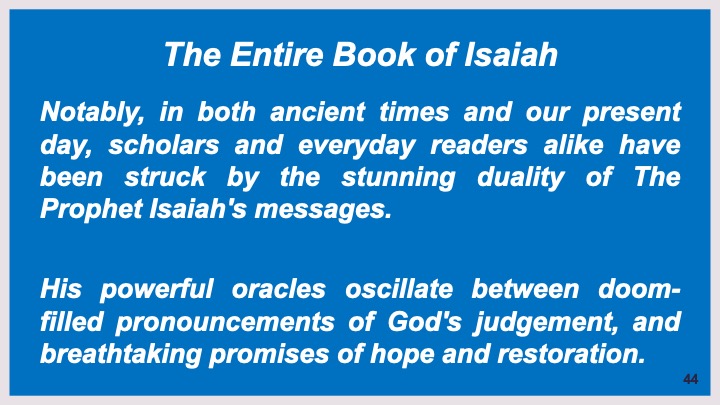
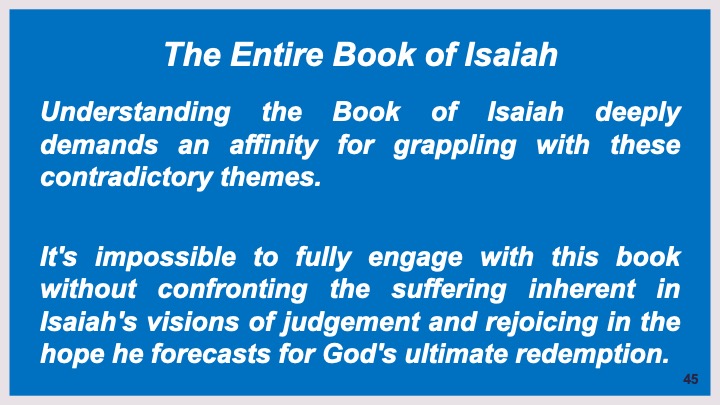
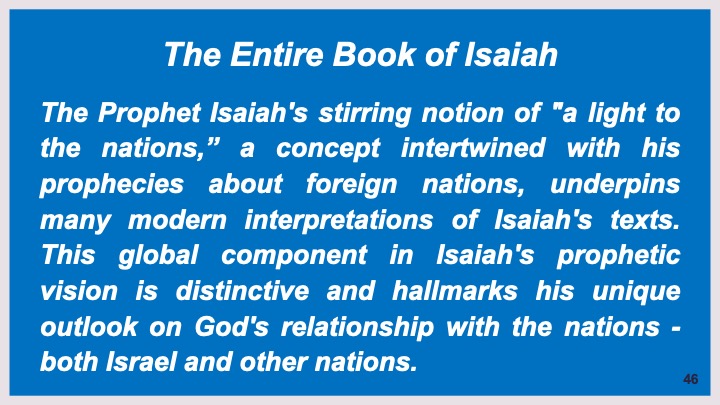
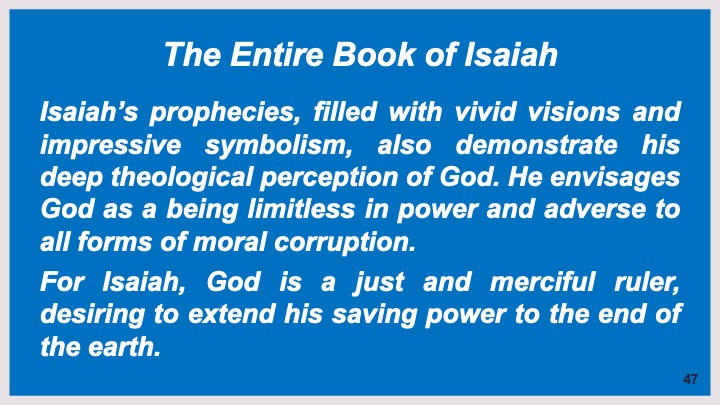
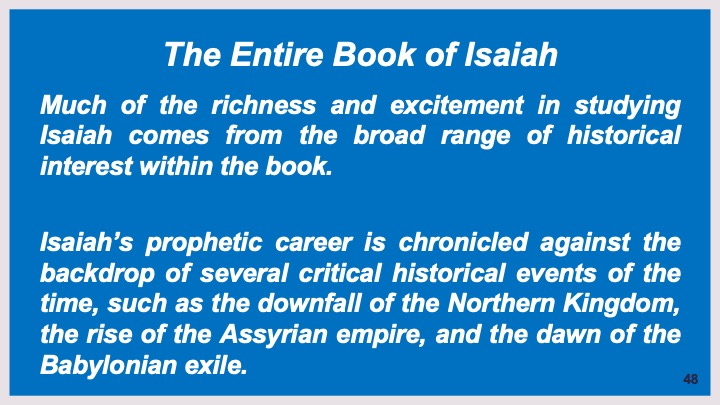
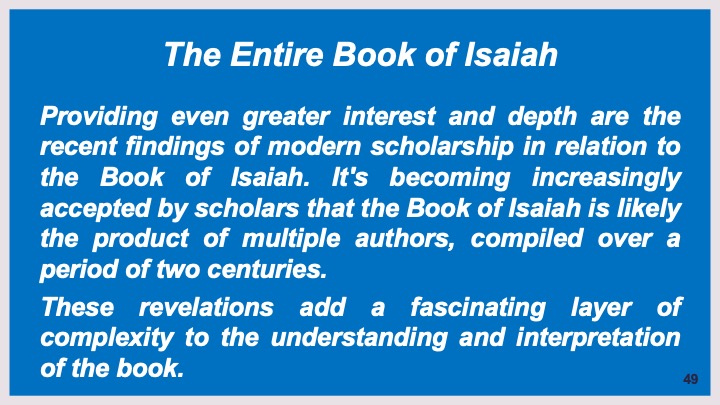
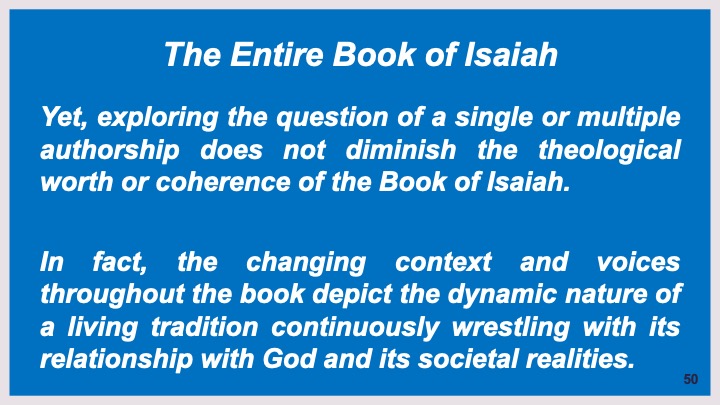
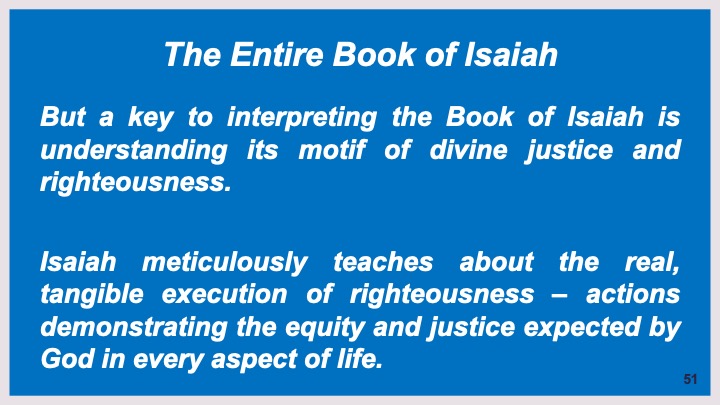
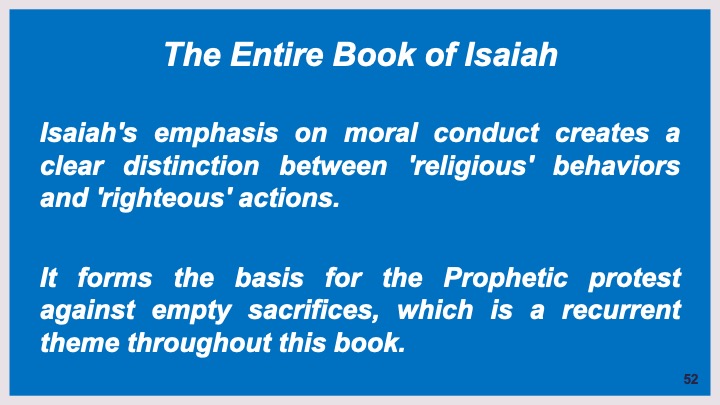
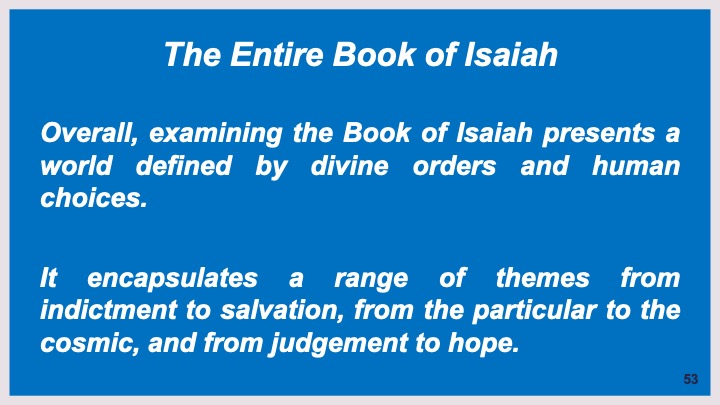
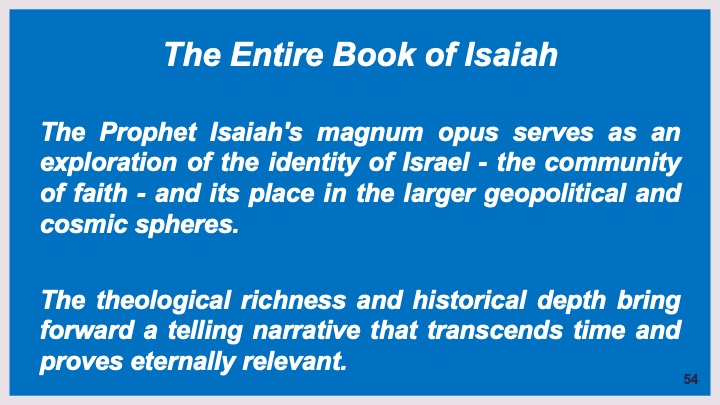
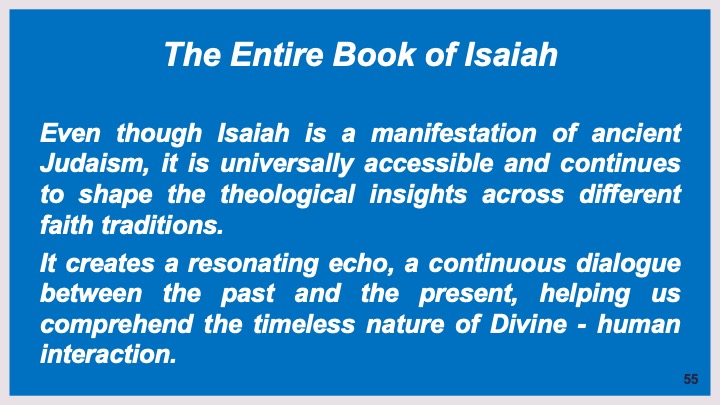
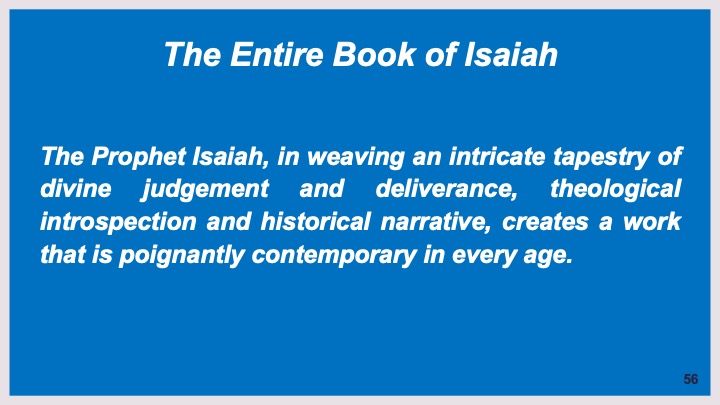
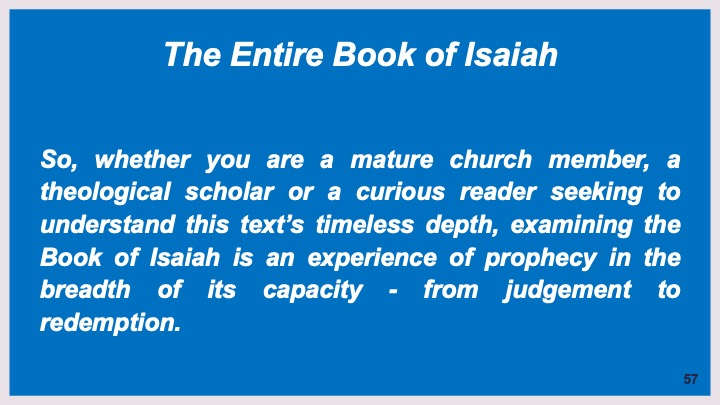
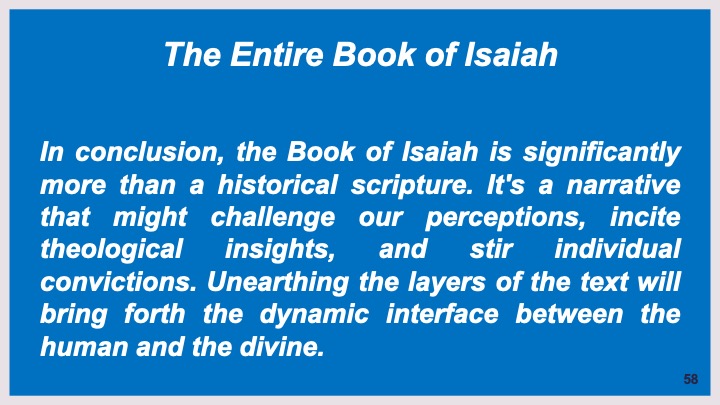
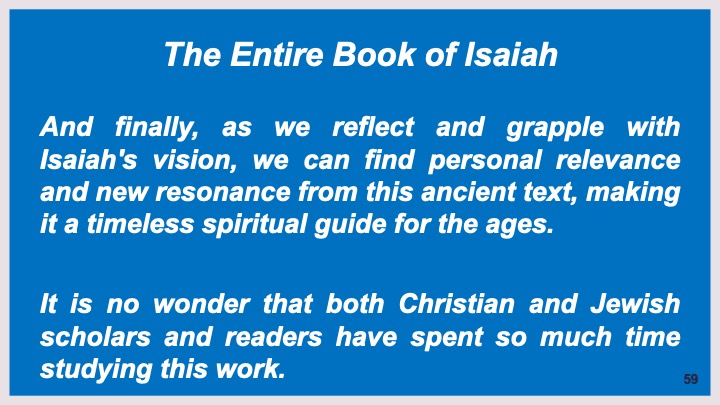
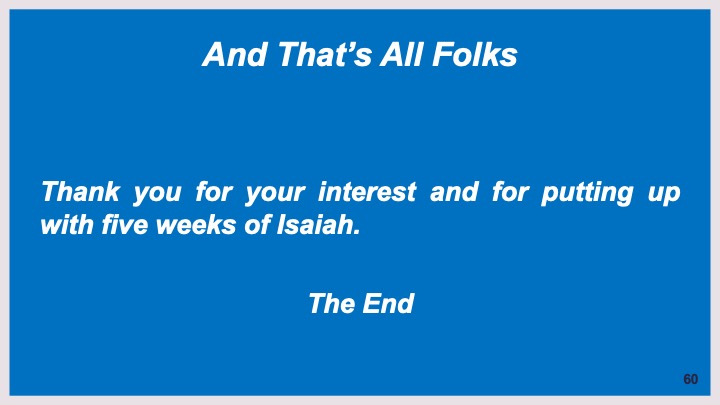
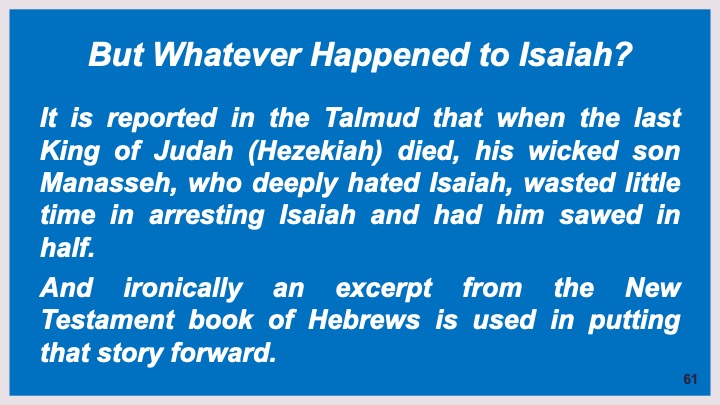
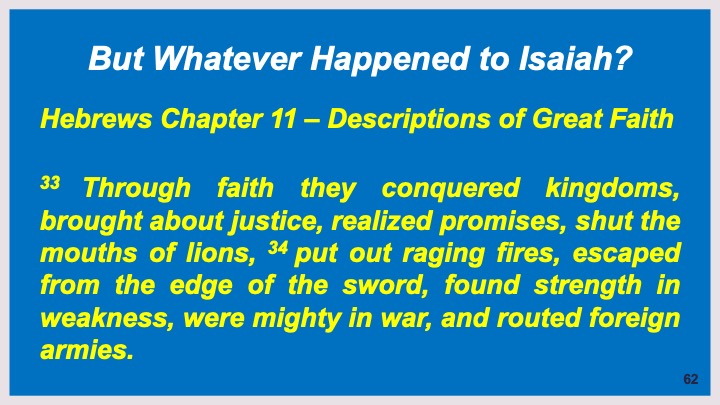
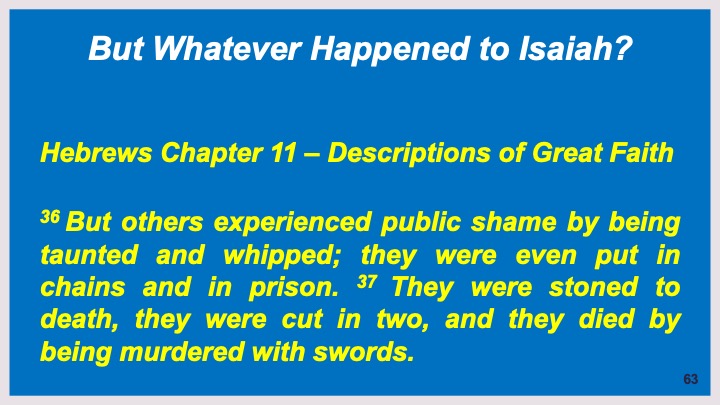
Examining the Book of Isaiah 5 Text
Examining The Book of Isaiah Part 5
And So We Come to Part 5
This is the last part of Isaiah - and that is probably a relief for you!
We will be moving into 3rd Isaiah, and again – circumstances have changed. The Persians have now engulfed Babylonia, and King Cyrus has encouraged the captives from Jerusalem to return and rebuild their temple.
Examining the Book of Isaiah Timeline
Where we see how the three parts of the book of Isaiah happen.
And after we learn about the distinctive aspects of 3rd Isaiah -
We will wrap up this study by looking overall at the entire body of the book of Isaiah, and do some analysis of this large Old Testament book and its place in our Bible.
But What About 3rd Isaiah?
The book of 3rd Isaiah, which comprises the last 11 chapters (chapters 56-66) of the Book of Isaiah, and addresses the post-exilic period after the Israelites' return from Babylonian captivity.
3rd Isaiah? – Social Justice, Inclusivity, and Trust
Overall, 3rd Isaiah teaches the importance of social justice, inclusivity, and trust in God's faithfulness during times of adversity. It is a message of hope, guiding the restored community in their pursuit of righteousness and a renewed relationship with God.
3rd Isaiah and Inclusion
Isaiah 56: 6-8
6 The immigrants who have joined me,
serving me and loving my name, becoming my
servants,
everyone who keeps the Sabbath without making it
impure,
and those who hold fast to my covenant:
7 I will bring them to my holy
mountain,
and bring them joy in my house of prayer.
I will accept their entirely burned offerings and
sacrifices on my altar.
My house will be known as a house of prayer for all
peoples,
8 says the Lord God, who gathers Israel’s
outcasts.
I will gather still others to those I have already gathered.
3rd Isaiah – Other Themes
3rd Isaiah also emphasizes the importance of true worship and genuine devotion for the returnees. Isaiah 58 critiques the outward religious rituals performed without genuine righteousness, calling for a sincere and compassionate approach to worship. The prophet highlights the value of caring for the needy and oppressed, connecting true worship with acts of social justice.
3rd Isaiah & Social Justice
Isaiah 58: 3-12
One key theme is the call for social justice and righteousness. Isaiah 58 highlights proper fasting and proper worship, emphasizing the importance of caring for the marginalized and oppressed. The prophet calls for a genuine transformation of hearts and actions.
Isaiah 58: 3-12
3 “Why do you fast and don’t see;
why afflict yourselves and you don’t notice?”
Yet on your fast day you do whatever you want,
and oppress all your workers.
4 You quarrel and brawl, and then you fast;
you hit each other violently with your fists.
You shouldn’t fast as you are doing today
if you want to make your voice heard on high.
5 Is this the kind of fast I choose,
a day of self-affliction,
of bending one’s head like a reed
and of lying down in mourning clothing and ashes?
Is this what you call a fast,
a day acceptable to
the Lord?
6 Isn’t this the fast I choose:
releasing wicked restraints, untying the ropes of a
yoke, setting free the mistreated,
and breaking every yoke?
7 Isn’t it sharing your bread with the hungry
and bringing the homeless poor into your house,
covering the naked when you see them,
and not hiding from your own family?
8 Then your light will break out like
the dawn,
and you will be healed quickly.
Your own righteousness will walk before you,
and the Lord’s glory will be your rear guard.
9 Then you will call, and the Lord will answer;
you will cry for help, and God will say, “I’m here.”
If you remove the yoke from among you,
the finger-pointing, the wicked speech;
10 if you open your heart to the
hungry,
and provide abundantly for those who are afflicted,
your light will shine in the darkness,
and your gloom will be like the noon.
11 The Lord will guide you continually
and provide for you, even in parched places.
He will rescue your bones.
You will be like a watered garden,
like a spring of water that won’t run dry.
12 They will rebuild ancient ruins on your account;
the foundations of generations past you will restore.
Jerusalem’s Coming Radiance
3rd Isaiah, consisting of chapters 56-66 in the Book of Isaiah, addresses the post - exilic period and the challenges faced by the Israelites upon their return from Babylonian captivity. One key theme is the restoration of the community, both physically and spiritually. Isaiah 60:1-7 speaks of a radiantly restored Jerusalem, symbolizing the return of God's presence and blessings to the people.
Isaiah 60: 1-7
60 1 Arise! Shine! Your light has
come;
the Lord’s glory has shone upon you.
2 Though darkness covers the earth
and gloom the nations,
the Lord will shine upon you;
God’s glory will appear over you.
3 Nations will come to your light
and kings to your dawning radiance.
4 Lift up your eyes and look all
around:
they are all gathered; they have come to you.
Your sons will come from far away,
and your daughters on caregivers’ hips.
5 Then you will see and be radiant;
your heart will tremble and open wide,
because the sea’s abundance will be turned over to you;
the nations’ wealth will come to you.
6 Countless camels will cover your
land,
young camels from Midian and Ephah.
They will all come from Sheba carrying gold and incense, proclaiming
the Lord’s praises.
7 All Kedar’s sheep will be gathered for you;
rams from Nebaioth will be your offerings;
they will be accepted on my altar,
and I will glorify my splendid house.
6 Countless camels will cover your
land,
young camels from Midian and Ephah.
They will all come from Sheba carrying gold and incense, proclaiming
the Lord’s praises.
3rd Isaiah – Another Theme
And yet another theme as we continue Examining the Book of Isaiah is the universal scope of the restored community. 3rd Isaiah envisions a community open to foreigners, challenging the exclusivity of the pre - exilic period. This vision depicts God's desire for a community that embraces diversity and offers salvation to all nations.
3rd Isaiah - A Restored Community
The restoration and rebuilding of Jerusalem also play a significant role. Isaiah 61 & 62 speaks of rebuilding ancient ruins and raising up devastated cities, portraying a hopeful future where the people will experience divine restoration and renewal.
3rd Isaiah & Jerusalem
Isaiah 62: 1-5
62 1 For Zion’s sake I won’t keep
silent,
and for Jerusalem’s sake I won’t sit still
until her righteousness shines out like a light,
and her salvation blazes like a torch.
2 Nations will see your righteousness,
all kings your glory.
You will be called by a new name,
which the Lord’s own mouth will determine.
3 You will be a splendid garland in
the Lord’s hand,
a royal turban in the palm of God’s hand.
4 You will no longer be called Abandoned,
and your land will no longer be called Deserted.
Instead, you will be called My Delight Is in Her,
and your land, Married.
Because the Lord delights in you,
your land will be cared for once again.
5 As a young man marries a young
woman,
so your sons will marry you.
With the joy of a bridegroom because of his bride,
so your God will rejoice because of you.
3rd Isaiah & Universal Salvation
Isaiah 66 18-23
18 Because of their actions and thoughts, I’m coming to gather all nations and cultures. They will come to see my glory. 19 I will put a sign on them, by sending out some of the survivors to the nations, to Tarshish, Libya, and Lydia, and to the archers of Cilicia and Greece - distant coastlands that haven’t heard of my fame or seen my glory. They will declare my glory among the nations.
20 They will bring your family members from all nations as an offering to the Lord - on horses, in chariots, in wagons, on mules, and on camels - to my holy mountain Jerusalem, says the Lord, like Israelites bringing an offering in purified containers to the Lord’s house. 21 I will select some of them as priests and Levites, says the Lord.
22 As the new heavens and the new
earth that I’m making will endure before me, says the Lord,
so your descendants and your name will endure.
23 From month to month and from Sabbath to Sabbath,
all humanity will come to worship me, says
the Lord.
3rd Isaiah - A Brief Summary
In summary, 3rd Isaiah addresses the post - exilic period and teaches the themes of restoration, repentance, universal salvation, and genuine worship. It encourages the people to return to God, embrace righteousness, and participate in the inclusive vision of God's kingdom.
The Entire Book
The Book of Isaiah, spanning sixty-six chapters, is undeniably one of the most comprehensive and encompassing books in the Bible.
It offers insight into the socio - cultural aspects of the times, prophetic visions, and indeed, some of the foundational precepts of the Christian faith.
When we embark on the journey of "Examining the Book of Isaiah", it's crucial to approach it with the aim of attaining new insights and developing an informed comprehension of the historical contexts that shaped the narratives within the book.
Isaiah, otherwise known as the Prophet Isaiah, is the primary figure around whom this book revolves. A prophet of prodigious stature, Isaiah played a significant role in the religious and political landscape of the southern kingdom of Judah during the eighth century B.C.E.
Isaiah’s prophetic career stretched over the reigns of four kings, breathing life into the stories contained within the book and enabling the exploration of diverse themes.
Kings of Judah During In the Time of Isaiah Kings of Judah Years of Reign Uzziah (Azariah) 767–740 B.C. Jotham 750–735 Ahaz 735–715 Hezekiah 715–686
As a reminder The Book of Isaiah is divided into three primary sections, each characterized by distinct themes, historical situations, and literary styles. There is 1st Isaiah (chapters 1-39), 2nd Isaiah (chapters 40-55), and 3rd Isaiah (chapters 56-66).
Conventional readings often combine the narratives in these sections; however, examining them separately, as we have done, can provide new insights and contextual understanding from the periods in which this book was written.
The first section, aptly named ”1st Isaiah", mainly includes oracles and prophesies from the lifetime of Isaiah himself, set against the backdrop of the socio-political challenges during the late eighth century B.C.E. These chapters address various concerns of that period, including the threat of foreign invasion and the infusion of foreign gods into the religious fabric of Judah.
Chapter six of First Isaiah provides an important narrative where Isaiah himself is called upon by God to be a prophet.
It perceptively illustrates his reticence about accepting this divine assignment – an aspect of his personality that allows the readers to relate more intimately with the Prophet Isaiah.
Second Isaiah, often referred to as Deutero-Isaiah, is traditionally believed to have been written during the Babylonian Exile.
This section heralds a shift in tone from judgement and impending doom to hope and divine redemption. It showcases God’s comfort and promises of restoration for His people.
This segment is marked by lyrical oracles and profound theologies, providing insights into the state of the exiles and their hope for deliverance. In arguably its most poignant section, Second Isaiah introduces the concept of the 'Suffering Servant,' which has since ignited endless theological debates and interpretations even in the contemporary era.
The third and final section, Third Isaiah or Trito-Isaiah, captures speeches and prophecies given after the exiles have returned to Jerusalem. It voices the tensions and trials faced by the community as it seeks to rebuild and re - establish its identity post -exile. Its later chapters reiterate the close relationship between moral integrity and worship - not just offering sacrifices, but creating a just society.
Examining the Book of Isaiah allows us to delve into the linguistics, literary style, and the socio-political context.
One notable aspect that makes the Book of Isaiah unique is the exquisite lyrical poetry and vivid metaphors that permeate its text.
Notably, in both ancient times and our present day, scholars and everyday readers alike have been struck by the stunning duality of The Prophet Isaiah's messages.
His powerful oracles oscillate between doom-filled pronouncements of God's judgement, and breathtaking promises of hope and restoration.
Understanding the Book of Isaiah deeply demands an affinity for grappling with these contradictory themes.
It's impossible to fully engage with this book without confronting the suffering inherent in Isaiah's visions of judgement and rejoicing in the hope he forecasts for God's ultimate redemption.
The Prophet Isaiah's stirring notion of "a light to the nations,” a concept intertwined with his prophecies about foreign nations, underpins many modern interpretations of Isaiah's texts. This global component in Isaiah's prophetic vision is distinctive and hallmarks his unique outlook on God's relationship with the nations - both Israel and other nations.
Isaiah’s prophecies, filled with vivid visions and impressive symbolism, also demonstrate his deep theological perception of God. He envisages God as a being limitless in power and adverse to all forms of moral corruption.
For Isaiah, God is a just and merciful ruler, desiring to extend his saving power to the end of the earth.
Much of the richness and excitement in studying Isaiah comes from the broad range of historical interest within the book.
Isaiah’s prophetic career is chronicled against the backdrop of several critical historical events of the time, such as the downfall of the Northern Kingdom, the rise of the Assyrian empire, and the dawn of the Babylonian exile.
Providing even greater interest and depth are the recent findings of modern scholarship in relation to the Book of Isaiah. It's becoming increasingly accepted by scholars that the Book of Isaiah is likely the product of multiple authors, compiled over a period of two centuries.
These revelations add a fascinating layer of complexity to the understanding and interpretation of the book.
Yet, exploring the question of a single or multiple authorship does not diminish the theological worth or coherence of the Book of Isaiah.
In fact, the changing context and voices throughout the book depict the dynamic nature of a living tradition continuously wrestling with its relationship with God and its societal realities.
But a key to interpreting the Book of Isaiah is understanding its motif of divine justice and righteousness.
Isaiah meticulously teaches about the real, tangible execution of righteousness – actions demonstrating the equity and justice expected by God in every aspect of life.
Isaiah's emphasis on moral conduct creates a clear distinction between 'religious' behaviors and 'righteous' actions.
It forms the basis for the Prophetic protest against empty sacrifices, which is a recurrent theme throughout this book.
Overall, examining the Book of Isaiah presents a world defined by divine orders and human choices.
It encapsulates a range of themes from indictment to salvation, from the particular to the cosmic, and from judgement to hope.
The Prophet Isaiah's magnum opus serves as an exploration of the identity of Israel - the community of faith - and its place in the larger geopolitical and cosmic spheres.
The theological richness and historical depth bring forward a telling narrative that transcends time and proves eternally relevant.
Even though Isaiah is a manifestation of ancient Judaism, it is universally accessible and continues to shape the theological insights across different faith traditions.
It creates a resonating echo, a continuous dialogue between the past and the present, helping us comprehend the timeless nature of Divine - human interaction.
The Prophet Isaiah, in weaving an intricate tapestry of divine judgement and deliverance, theological introspection and historical narrative, creates a work that is poignantly contemporary in every age.
So, whether you are a mature church member, a theological scholar or a curious reader seeking to understand this text’s timeless depth, examining the Book of Isaiah is an experience of prophecy in the breadth of its capacity - from judgement to redemption.
In conclusion, the Book of Isaiah is significantly more than a historical scripture. It's a narrative that might challenge our perceptions, incite theological insights, and stir individual convictions. Unearthing the layers of the text will bring forth the dynamic interface between the human and the divine.
And finally, as we reflect and grapple with Isaiah's vision, we can find personal relevance and new resonance from this ancient text, making it a timeless spiritual guide for the ages.
It is no wonder that both Christian and Jewish scholars and readers have spent so much time studying this work.
And That’s All Folks
Thank you for your interest and for putting up with five weeks of Isaiah.
The End
A Few Extra Slides
But Whatever Happened to Isaiah?
It is reported in the Talmud that when the last King of Judah (Hezekiah) died, his wicked son Manasseh, who deeply hated Isaiah, wasted little time in arresting Isaiah and had him sawed in half.
And ironically an excerpt from the New Testament book of Hebrews is used in putting that story forward.
Hebrews Chapter 11 – Descriptions of Great Faith
33 Through faith they conquered kingdoms, brought about justice, realized promises, shut the mouths of lions, 34 put out raging fires, escaped from the edge of the sword, found strength in weakness, were mighty in war, and routed foreign armies.
36 But others experienced public shame by being taunted and whipped; they were even put in chains and in prison. 37 They were stoned to death, they were cut in two, and they died by being murdered with swords.
End of Text